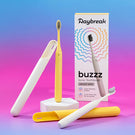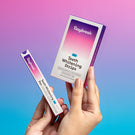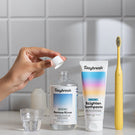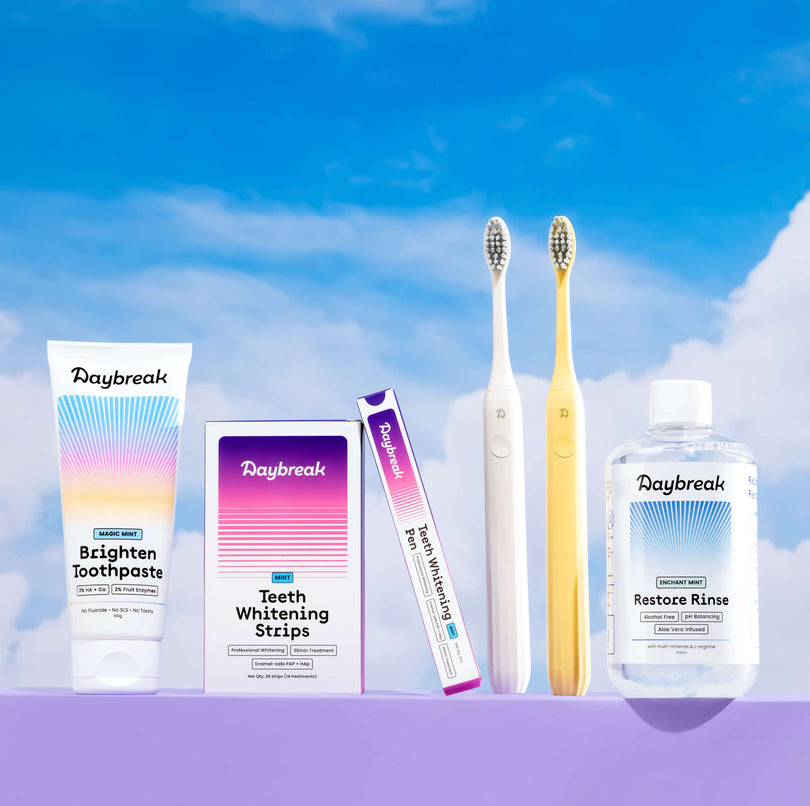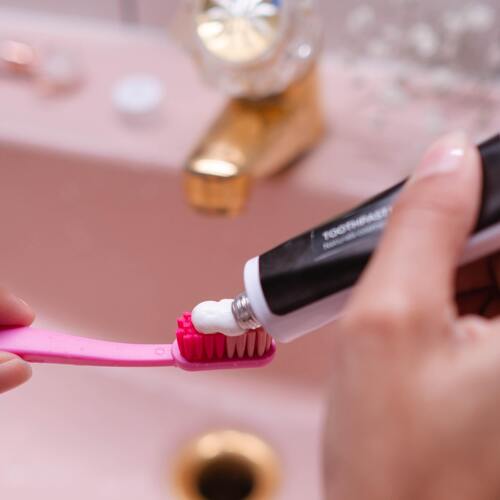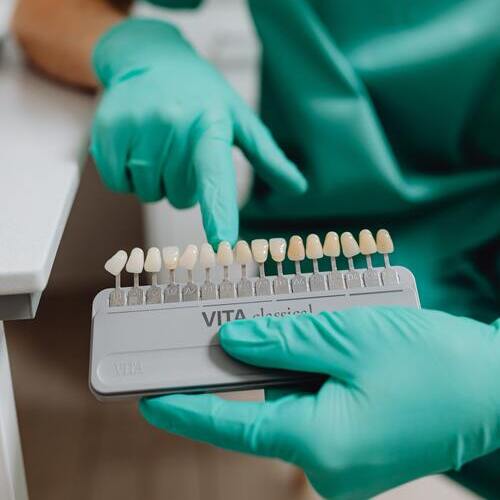Have you ever noticed that your smile just isn't as bright as you would like it to be? Are you curious about the effect that the consumption of colourful foods can have on your teeth? We all know that the best way to start a good day is with a nice, warm cup of tea or coffee. Hot chocolate in winter and iced tea in summer are indispensable. But did you know that these drinks can be the cause of tooth discolouration?
Consumers today have several options to choose from to address the problem of tooth discoloration. Among the vast array of oral beauty essentials, teeth-whitening toothpaste holds the champion’s title due to its ubiquity. There are several whitening toothpastes available in stores, each with taller claims about delivering a brighter smile within impossibly short periods of time.
But do they work as advertised, or is it all marketing? Let us help you choose the best option for you and take you on a journey in search of the truth (and the science behind it).
The Culprit Behind Tooth DiscolorationThe term ‘tooth discoloration’ describes the process of teeth becoming stained or darkened. There are two types of tooth discoloration:
- Intrinsic discoloration - It affects the inner part of the tooth (the dentin), primarily caused by the intake of certain medication, trauma, or excessive fluoride consumption.
- Extrinsic discoloration - It affects the outer part of the teeth, primarily caused due to dietary habits, smoking and other lifestyle factors.
Tooth discoloration can be caused due to multiple factors, a few of them are-
- Tobacco Intake and Smoking: According to the WHO, approximately 30% of the adult Indian population consumes tobacco in one form or another. Tobacco intake and smoking cause remarkable tooth staining. The chemicals present in tobacco, such as nicotine and tar, are known to discolour teeth over time. These substances can penetrate the enamel of the teeth and leave yellow or brown stains on the surface.
- Tea and coffee consumption: It's no secret that Indians love tea and no morning is complete without it. However, regular consumption of foods and beverages like tea, coffee, wine, soy sauce, cranberries and blueberries etc. are the main cause of extrinsic discoloration. Black tea causes more discoloration than coffee. Discoloration is caused by tannins, which are found in the above mentioned foods. The enamel absorbs tannins, causing stains to develop.
- Improper or irregular brushing habits: When plaque and food particles are not effectively removed from the teeth, they can build up and lead to discoloration. An inadequate brushing technique or not brushing frequently enough allows these substances to accumulate and cause stains.
Selecting the Ideal Tooth-Whitening Toothpaste
Discovering the best whitening toothpaste amidst the myriad of options available on store shelves can be quite a challenge. We'll make it easier for you by providing you with some crucial factors to take into account before choosing:
- Ingredient Inspection: Before you make your purchase, we strongly recommend checking the composition of the toothpaste. Make sure you look for hydroxyapatite crystals in the composition. Unlike traditional whitening agents that may contain chemicals or abrasive ingredients, hydroxyapatite crystals work by filling in microscopic cracks and crevices on the tooth surface, restoring its natural whiteness. Fluoride-free toothpaste with hydroxyapatite crystals offers a more sustainable approach to tooth whitening, as the remineralization process can lead to long-term improvements in tooth colour and overall oral health. Other great ingredients that can deliver whitening effects include PAP, certain fruit enzymes (papain and bromelain) and calcium carbonate. Hydrogen peroxide and charcoal are ingredients to be avoided since they can lead to enamel damage in the ling run.
- Sensitivity Solutions: If you're experiencing tooth sensitivity, it's a good idea to find a toothpaste that not only whitens your teeth but also soothes sensitive teeth. Again, a toothpaste with hydroxyapatite crystals can help minimise sensitivity by strengthening the enamel. This prevents the exposure of dentin, which leads to sensitivity. Remember, your smile deserves both radiance and comfort.
- Avoid Abrasives: Steer clear of toothpaste products containing harsh abrasives. Make sure you avoid toothpaste ingredients such as activated charcoal. These abrasive substances can potentially erode your tooth surface over time, so it's best to prioritise the long-term health of your teeth.
- Patience Pays Off: Keep in mind that the time required to achieve optimal whitening results may vary. The nature of your stains and your daily oral care routine significantly influence the pace of improvement.
You might wonder if whitening toothpaste truly does its job. Well, scientifically, it can indeed remove surface stains and bring out a brighter smile. But remember, its effectiveness depends on factors like the kind of stains you have and how devoted you are to taking care of your teeth. While it's quite good at tackling surface discoloration, tougher, embedded stains might call for more specific solutions.
- Immediate effects: If your teeth are getting stained from dietary or drinking habits, whitening toothpaste can help you remove these stains before they become permanent, within 2-6 weeks of regular usage.
- Long-term effects: It’s important to note that whitening toothpaste requires you to use it at least once or twice daily to obtain the best results. You might need to brush regularly ranging from several weeks to a few months to obtain perfectly stainless teeth.
|
Pros of Tooth Whitening Toothpaste |
Cons of Tooth Whitening Toothpaste |
|
Non-Invasive Approach: Offers a gentle method of maintaining a brighter smile. |
The effect is limited to superficial stains and might not fully address deep or intrinsic discoloration. |
|
Convenience: Easily incorporated into daily oral care routines. |
Gradual Results: It works on the enamel for 2 minutes while brushing (4 mins/day) which is very little time to act on stains. |
|
Cost-Effective: Generally more affordable than professional whitening treatments. |
Sensitivity Risk: Overuse can lead to tooth sensitivity and enamel erosion. |
The journey to find the best teeth-whitening toothpaste is more than just about getting a bright smile and white teeth. It's also about understanding the science, the ingredients, and your oral health.
It can help with surface stains, but its effectiveness depends on the kind of stains and how you care for your teeth. Knowing what's in it helps you pick smartly. For healthier and more effective transformations, consider professional advice. Balancing radiance with overall oral wellness should be your ultimate goal.
Is Teeth Whitening Toothpaste Worth It? Alternative Options to ConsiderWhitening toothpaste can be a valuable addition to your oral care regimen, especially for maintaining a bright smile. However, it's essential to set realistic expectations. If you're looking for a dramatic transformation, professional treatments may be more suitable.
As for alternatives, consider teeth whitening strips or the tooth whitening pen available at Daybreak. These products offer convenience and can be effective in achieving whiter teeth. The strips adhere to your teeth, delivering an enamel-safe PAP+ formula directly where it’s needed, while the pen provides a quick and easy application process on the go. Both options can provide noticeable results within 2-3 weeks of consistent use.
In conclusion, the quest for a whiter smile is a personal journey. Whether you choose teeth-whitening toothpaste, strips, or a whitening pen, make sure it aligns with your goals and fits comfortably into your oral care routine. Remember that maintaining good oral hygiene and regular dental check-ups are crucial for overall oral health and a radiant smile.

